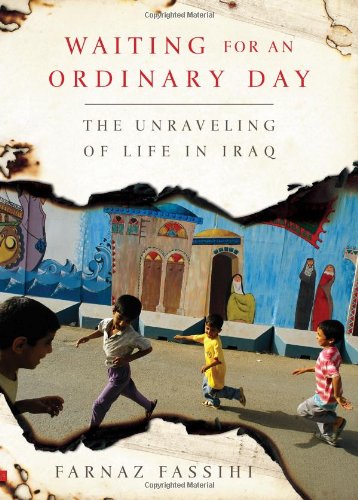
Waiting for an Ordinary Day
The Unraveling of Life in Iraq
کتاب های مرتبط
- اطلاعات
- نقد و بررسی
- دیدگاه کاربران
نقد و بررسی

August 11, 2008
With the intriguing premise focused on the neglected citizens of occupied Iraq, Fassihi, the Wall Street Journal
's senior Middle East correspondent, gathered numerous interviews throughout the war-torn cities and religious strongholds of Iraq. The author first came to international attention when a personal e-mail chronicling the “rapidly deteriorating situation” in Iraq made its way onto blogs in 2004; in this book, written in the “same spirit” as the e-mail, she dissects the convoluted conflicts and connections that closely bind the two major religious groups jockeying for control in the occupied land. She talks to a wide range of people, from staid government personnel to fiery clerics to zealous students, about the country's unstable political and social climate. Fassihi, of Iranian descent, cajoles the normally media-shy working and middle-class people of Sulaimaniyah, Baghdad, Kirkuk and Tikrit to speak on the before-and-after conditions of their civil freedoms. Through these conversations, Fassihi posits hard political and moral questions.

August 15, 2008
Most of the books spawned by the U.S. invasion of Iraq have focused on political developments, policy, and military experiences in the process of invading and then stabilizing that country. This highly readable book by the "Wall Street Journal"'s deputy bureau chief for the Middle East and Africa delves into the war's impact on the daily life of ordinary Iraqis. Fassihi, an Iranian American, goes beyond the megaheadlines and sterile discussion so prevalent in much reporting about Iraq and brings to life the trials and tribulations that the Iraqi people endure every day, showing that they are the unsung heroes of the calamitous conflict. Fassihi's reporting is informed by meaningful interactions with Iraqis and her keen personal observations on the impact of the continuing occupation of that country. An additional interesting feature is the author's September 2004 email to her family and friends, later distributed widely by various bloggers, in which Fassihi vividly explains the deteriorating conditions in Iraq and the dangers faced by journalists covering the war. Recommended for all public libraries.Nader Entessar, Univ. of South Alabama, Mobile
Copyright 2008 Library Journal, LLC Used with permission.

Starred review from September 1, 2008
As the senior Wall Street JournalMiddle East correspondent, Fassihi is more than credible in her candid assessment of the U.S. invasion of Iraq. On the ground in Baghdad both before and after Saddams fall, she focused her attention on the most overlooked aspect of the invasion: the Iraqi middle class. In her interviews with Sunnis and Shias, the secular and devout, those who are pro- and anti-American, Fassihi provides a startling compendium on what could have gone right if everything had not gone so wrong. Her frustration with errors of estimation and planning made by the U.S. government is palpable as she records the deterioration of goodwill. Through her careful collection of interviews and investigations, readers finally understand how the occupation became a war fought bymultiple factions. What is heartbreakingis that it could have been avoided, and that this fact is so obvious.Its astounding, Fassihiwrites, that the Americans seem so oblivious to their surroundings, with an inherently selective eye for whats occurring in Iraq. This is not politics but reportage written, at last, in a way that anyone, regardless of national origin, can understand.(Reprinted with permission of Booklist, copyright 2008, American Library Association.)

























دیدگاه کاربران